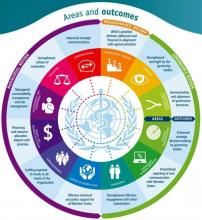Change @ WHO Ethiopia
WHO reform taking shape in the country office.
As the world changes and global health challenges become increasingly complex, organizations need to innovate and transform to respond to change at multiple levels. WHO reform aims to position the Organization to better address these challenges by establishing clear priorities, combined with adopting better management and governance practices. The reform process is driven by WHO member states with the goal of ensuring that WHO can more effectively fulfil its constitutional mandate as the “directing and coordinating authority on international health work.”
The reform process has three pillars: programmatic, governance and managerial. As a result of the programmatic reform WHO’s priorities will be defined and addressed in a systematic, transparent, and focused manner and financed in alignment with the agreed priorities. The governance reform will strengthen the oversight by governing bodies, harmonize and align governance processes, enhance strategic decision-making by governing bodies, as well as improve engagement with member states and other stakeholders. The managerial reform focuses on strengthening WHO’s accountability, transparency and risk management, as well as strategic communications and monitoring and evaluation (M&E) of the reform process.
"All of this ultimately means a programme of work with an impact on health outcomes that can be measured, which is adequately and appropriately financed, and for which WHO can be readily held accountable."
WHO's Director-General Dr Margaret Chan
Currently the reform process is shifting from upstream work on policy analysis to an intensive period of implementation, two major themes will guide reform efforts over the 2014-2015 biennium: focusing reform efforts on areas of greatest benefit to the Organization; and institutionalizing the change being catalysed by reform through a more strategic approach to change management.
Dr Gaudenz Silberschmidt, Senior Adviser to Director-General, visited the WHO Country Office for Ethiopia (WCO) in June 2014 to brief the country team on the implications of the reform process and hear what steps the country office has already taken to respond to the WHO reform. As part of the WHO reform in Ethiopia, WHO priorities are agreed and aligned with Federal Ministry of Health as part of the programmatic reform, a public-private-partnership forum and guidelines were supported as a response to the governance reform, and as part of the managerial reform, accountability and transparency have been improved through the establishment of the Country Region and Analysis and Support (CRAS) unit to strengthen policy analysis and monitoring and evaluation.
In July 2014, a WHO administration and programme review mission visited WCO to assess the readiness of the country office to implement the reform and identify ways to improve the effectiveness and efficiency and programme management. The mission acknowledged that as the reform process progresses in Ethiopia, WHO is becoming more ‘fit for purpose’, and able to respond rapidly and effectively to the public health challenges of today, and those we will face in the future.
For more information on the WHO Reform, please visit: More information
For more information, please contact Ms Viivi Erkkila, Communication, Partnership and Resource Mobilization Officer, WHO Ethiopia, email: erkkilav [at] who.int
PHOTOS: WHO Ethiopia/ Viivi Erkkila



